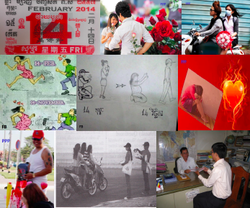
The study, titled, Love and Sexual Relationships: A Longitudinal Study of the Experiences and Plans Of Wealthier Young People Regarding The Upcoming Valentine’s Day In Phnom Penh, 2009-2014 (A Quantitative Study) was privately funded and conducted by independent public health researcher and newspaper columnist, Tong Soprach, MPH.
I admire Soprach’s energy and enthusiasm for conducting much needed research around sex and sexuality in Cambodia, and fully support and encourage the capacity building of local research and researchers. Soprach has been a friend and colleague since I began my own research there a decade ago, and still is. However, despite being graciously thanked in the acknowledgements and cited in the text of the final report, I struggle to support research that is ethically, methodologically and analytically dubious. Thus, in the name of creating healthy and open debate with a colleague and friend, I will outline some of the issues I have with the study here.
Soprach consulted both myself and a few other academics and professionals prior to conducting the research. The problem, however, is that much of the advice was disregarded, and the study was designed, peer interviewers were trained, the survey was conducted, the data (from 715 particpants) was analyzed, and the report was published online (without any peer-review)—in less than 30 days, from start to finish. Feeling under pressure to conduct a 5-year follow-up to his original Valentine’s study on this same topic in 2009, he ignored concerns over ethical issues, methodological issues, survey design issues, risks related to rushing the study, and risks around how the study may be used to create further panic and fear around young people and sex. And it appears as though that is exactly what it’s doing.
Likely due to Soprach’s media connections related to his job as the social affairs columnist for the Phnom Penh Post’s Khmer Edition, the results from the study have been picked up this week by the Phnom Penh Post (headline: “Valentine’s Day Rape Fears”) and the Post Khmer edition, the UK Guardian (“Cambodian Valentine's survey raises concerns over rape and sexual violence”), the Bangkok Post (“More Cambodians Eye Valentine’s Sex”), Cambodian Radio RFI, and Radio Australia—Khmer edition, among others. He has also presented the research at Khmerarak University, and distributed the report to high school principals all over Phnom Penh in the days leading up to Valentine’s Day.
My objective is not to point out all of the flaws of the study or the report itself. Instead, I will highlight the most pressing issues. First off, the survey was designed to measure self-reported “intent”—not actual self-reported sexual “behavior”. Thus, while it may be interesting to collect data on what people “might” do on Valentine’s Day, it does not take into account what people actually “did” do—which depends on the context of the situation, as well as other factors, and which may be at complete variance with what the original “intended” behavior may have been.
Secondly, the question that was used to measure male intention around gaining sexual “consent” (or the lack thereof, which was correlated with rape in the findings—and the issue of which most of the media coverage concerns) is biased and leading:
If your girlfriend does not agree [to have sex on Valentine’s day], what will you do?
(Please tick only one)
- I will give her more expensive gift with the aim of having sex with her
- I will pressure her by taking her far from town to try to have sex with her
- I will trick her by staying out til very late, and use a story like I have no key to get into my house, or no one can open the door for me, to try to have sex with her
- I will say to her if we don’t have sex we don’t really love each other, to try to get her to agree
- I will take her to a Karaoke club and do what I want to try to have sex with her
- I will pressure her to watch pornography to try to have sex with her
- I will force her to have sex
- No, I will ignore sex, and just hang around for fun
- Other (Specify)
Not only are the options problematic and leading, but the statistic that keeps getting circulated (i.e. in the Guardian: “Survey finds 47.4% of young men in capital Phnom Penh willing to force their partner into having sex this Valentine's Day”) is very misleading and just plain wrong. This is not only because it’s being used by the media to represent all young men in Phnom Penh—when the data from such a small study (376 men) are clearly not generalizable to the whole city, but also because when you look closely at the data, only 61 single males (not in a couple) responded to the above question (another 38 males who are in a couple also responded to this question, but for some reason, they are not included in this statistic of 47.4%) (p. 28-29).
52.6% of those 61 single men actually responded with “I will ignore sex and just hang around for fun.” That number was then subtracted from 100%, and the figure of 47.4% (out of 61 single men) was generated to represent a positive response to the other responses above, which were combined and interpreted to represent “non-consensual” options. To put it simply, 47.2% of only 61 single men answered yes to questions that implied they would potentially engage in coercive behaviors to get women to have sex.
While it is troubling that even 29 out of 61 “wealthy” men said they would potentially behave coercively, this is hardly representative of all young men in Phnom Penh, yet it is now a statistic that is being circulating far and wide, further pathologizing and already pathologized country (e.g. whenever I say I do research in Cambodia, people typically associate Cambodia with two things: violence and sex trafficking, because those are the only stories that get media attention).
This misleading figure will also likely be used as fuel by the government and schools to continue their abstinence and anti-sex campaigns in the days leading up to Valentine’s day, and to justify the physical policing of guesthouses in order to prevent young people from having sex—which is becoming a regular practice on February 14 in and around Phnom Penh.
I believe that Soprach was genuinely well-intentioned with this study (though his research objectives are not well-articulated anywhere in the report). It is clear that he is trying to draw attention to pressing public health issues in Cambodia, such as sexual and reproductive health, HIV, unsafe abortions, and rape. However, many of the conclusions and recommendations made are shaky, at best. For example, in the Discussion section, it is suggested that the increase in young couples planning to have sex on Valentine’s day somehow relates to the females seeking unsafe abortions—a totally presumptuous and unfounded correlation, as no questions are asked about pregnancy and abortion.
Earlier on in the report, he uses my own findings on the psycho-behavioral consequences of failed relationships between Cambodian bar workers and their western boyfriends (which can sometimes result from socio-cultural challenges and misunderstandings, and can include self-harming behavior and suicide attempts related to depression and pain of rejection among other things) to suggest that suicide is a real threat among the population in his study when they have sex on Valentine’s Day. He then goes as far as recommending that police provide 24-hour security on the two main bridges in Phnom Penh to thwart suicidal jumpers. The evidence cited to correlate suicide with Valentine’s Day was taken from one Cambodia Weekly article in 2009, whereby a deputy chief of the Intervention Police Unit of the Ministry of the Interior apparently claimed there was an increase in suicides around the day. This may have been true in 2009, but there are no questions whatsoever in Soprach’s survey which measure mental health or suicidal feelings related to sexual activity—thus this recommendation does not relate at all to his actual findings.
My intention here is not to completely lambast this study, as Soprach does make some sound recommendations at the end of the report, such as suggesting that public health programmers, parents and teachers should increase awareness around sexual reproductive health, HIV, sexual consent, “sexual rights” (which are vaguely defined in the report), and encourage increased communication around sexual reproductive health among parents and youth. He also encourages young people to use condoms when choosing to be sexually active, and to remember they have a “choice” to have sex or not.
These are incredibly important recommendations that make sense. But they are couched (and almost hidden) among the other main messages of the report: sex between young people is dangerous and something to be feared; parents and law enforcement should work harder to police young people’s sex lives; and Valentine’s day—an evil Western holiday—it to blame for rape, suicide, unsafe sex, unsafe abortions, and increased HIV among young people. And the ultimate solution to all this is to remind young people to honor conservative Khmer culture and tradition.
However, a return to “conservative” Khmer culture—one that requires young women to be subordinate to men and one that promotes a plethora or gendered double standards and stereotypes—may not be the answer to the above issues. Nor is the policing of guesthouses, bridges and ultimately the sex lives of young people. Nor is conducting—and disseminating on a global scale—hasty and not well-designed research, which is then used to fuel hysteria, fear and moral panic around youth sexuality and sexual behavior.
A better solution may have been to pay extra care, time, and attention to developing a genuinely ethical and methodologically sound project that addresses these incredibly sensitive and pressing issues—one that is carefully designed and analyzed, peer-reviewed and collaborative, more objective and less biased, and one that is ultimately youth-centered—perhaps focusing on what the young people themselves view as important tools that could help them to make safer sexual decisions and healthier relationship choices.
Creating fear around sex does not stop people from having sex. We know that abstinence campaigns don’t work—look at the US! These anti-sex crusades, and the research that fuels them, are actually dangerous because they disempower young people, whom are left fending for themselves without proper understanding and tools that would help them make better decisions. Exaggerated media campaigns are used to create hysteria, reinforce stereotypes and exacerbate pre-existing inequities. These ultimately serve to justify the agendas of those in positions of authority—not the young people who are in desperate need for good quality sex education and information.
It is my hope that future studies on youth sexuality focus on promoting meaningful cultural reflection and change regarding sexual behaviors and gender norms, which may then lead to a shift away from fear-based abstinence programming, and toward more youth-centered, reality based sex education programming. The sexual health and well-being of young people in Cambodia are dependent on it.

 RSS Feed
RSS Feed